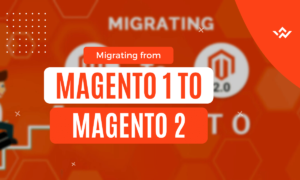What is Magento?
Magento is a powerful eCommerce platform that allows businesses to create and manage online stores. Its open-source technology gives users complete control over the look, functionality, and content of their online store. It offers a free version and a feature-rich version, allowing businesses to grow and evolve without changing platforms. Customizable options, such as plug-ins and themes, are available to improve customer experience and relationships.
Magento is highly recommended for businesses of all sizes. It offers a variety of tools and features for businesses to take control of their online store and create a personalized shopping experience for customers.
What is Magento 2?
Magento 2 is the latest version of the popular eCommerce platform. It offers a flexible architecture, engaging customer experiences, faster loading speeds, secure payments, and easier maintenance. It’s a better, faster, and safer version of Magento. Upgrade to Magento 2 for a scalable website.
What is an Extension in Magento?
Magento extensions improve online stores. They increase loading speed, enhance customer experience and integrate with your store on the backend. Thousands of extensions are available in the Magento Marketplace for customer services, payments, security, marketing, accounting, shipping, and site optimization. Improve your store by searching the Magento Marketplace.
What is the difference between Magento 1 and Magento 2?
Magento 1 and 2 are both open-source e-commerce platforms, but Magento 2 is a newer and improved version of the original Magento platform. Some of the key differences between the two include improved performance and scalability, a more modern and user-friendly admin interface, enhanced security features, and native support for mobile devices.
- Magento 2 offers improved performance and scalability compared to Magento 1.
- Magento 2 features a modern and user-friendly admin interface.
- Magento 2 offers enhanced SEO capabilities.
- Magento 2 includes built-in support for mobile devices.
- Magento 2 provides better security features.
- Magento 2 offers improved checkout and order management.
- Magento 2 allows for easier customization and extension development.
Architecture
Magento 2 architecture is a significant improvement over Magento 1. The developers have completely redesigned the technology stack to include new technologies that improve website optimization and customization. Some of the key differences between Magento 1 and 2 include the use of Composer, NGINX, Redis, Symfony, and Varnish.
Composer allows developers to easily reuse third-party libraries without having to deal with the source code, which can help to reduce extension conflicts. NGINX serves as a reverse proxy, HTTP cache, and load balancer, which can help to improve website performance. Redis is used as a database cache and broker for messages, which can help to improve website speed. Symfony makes content control easier, improves functionality, and enhances website appearance. And lastly, Varnish is used to increase website speed.
Overall, the new technologies used in Magento 2 provide better performance and more customization options for developers. However, it should be noted that transferring to Magento 2 requires more than just data migration, as the new technologies used in Magento 2 are not compatible with Magento 1.
Website Performance
Magento 2 addresses the issue of poor website performance that was prevalent in Magento 1. The new version is optimized for faster loading times and reduced server response times and provides access to more extensions that can improve performance further. It also offers more customizability and flexibility in website design and content, giving users more control over how they present their website and allowing them to optimize the content for faster performance.
Using Magento’s Admin Panels
Magento 2 improves upon the admin panel of Magento 1 by making it easier to navigate. Although there is still a learning process, it is more favorable than the setup process in Magento 1. The dashboard includes useful statistics such as new orders, last orders, average orders, lifetime retail sales, top search keywords, income tax, and bestsellers. Additionally, Magento 2 allows for easy customization of data to improve the customer experience.
Extensions
Magento 2 solves the extension conflicts issue present in Magento 1 by allowing extensions to overlap, making it easier to install and use multiple extensions. However, it is important to be cautious and not overload your store with too many extensions as it can lead to loading and usability issues. To ensure a smooth experience for your customers and increase sales, only use extensions that bring value to your website, improve the customer experience, and help you make sales. Additionally, you may want to integrate other company accounts or improve security.
Security
Magento 1 is no longer supported and lacks security patches and updates, putting sites at risk. In contrast, Magento 2 offers regular patches and updates and allows for enhanced security through extensions. It is important to note that while the platform makes it easy to achieve PCI compliance, it is ultimately the responsibility of the user to ensure it is met, especially if they heavily customize their website.
Customer Support
Magento 1 is no longer supported and you cannot receive updates or patches from the developers. With Magento 2, customer support depends on the version you choose. The free version, Magento Open Source, does not include customer support while the paid version, Magento Commerce, does.
What is the best Magento version for me?
Magento 2 is the latest version of Magento and is considered safer and more efficient than 1. Support for Magento 1 ended on June 30, 2020, so if you are still using it, you may face fines and security issues. You need to upgrade the version as soon as possible.
Conclusion
Magento is a popular open-source e-commerce platform that offers businesses a wide range of features and flexibility. Magento 1 was the initial version of the platform, while Magento 2 is the latest version with improved performance and enhanced functionality. Both versions provide a comprehensive solution for online stores, including inventory management, payment processing, and SEO optimization. However, the latest version offers better scalability and security, making it the preferred choice for businesses looking to expand and improve their online presence. Overall, it is a powerful e-commerce platform that can help businesses grow and succeed online. Here are the more updated Blogs related to this.


